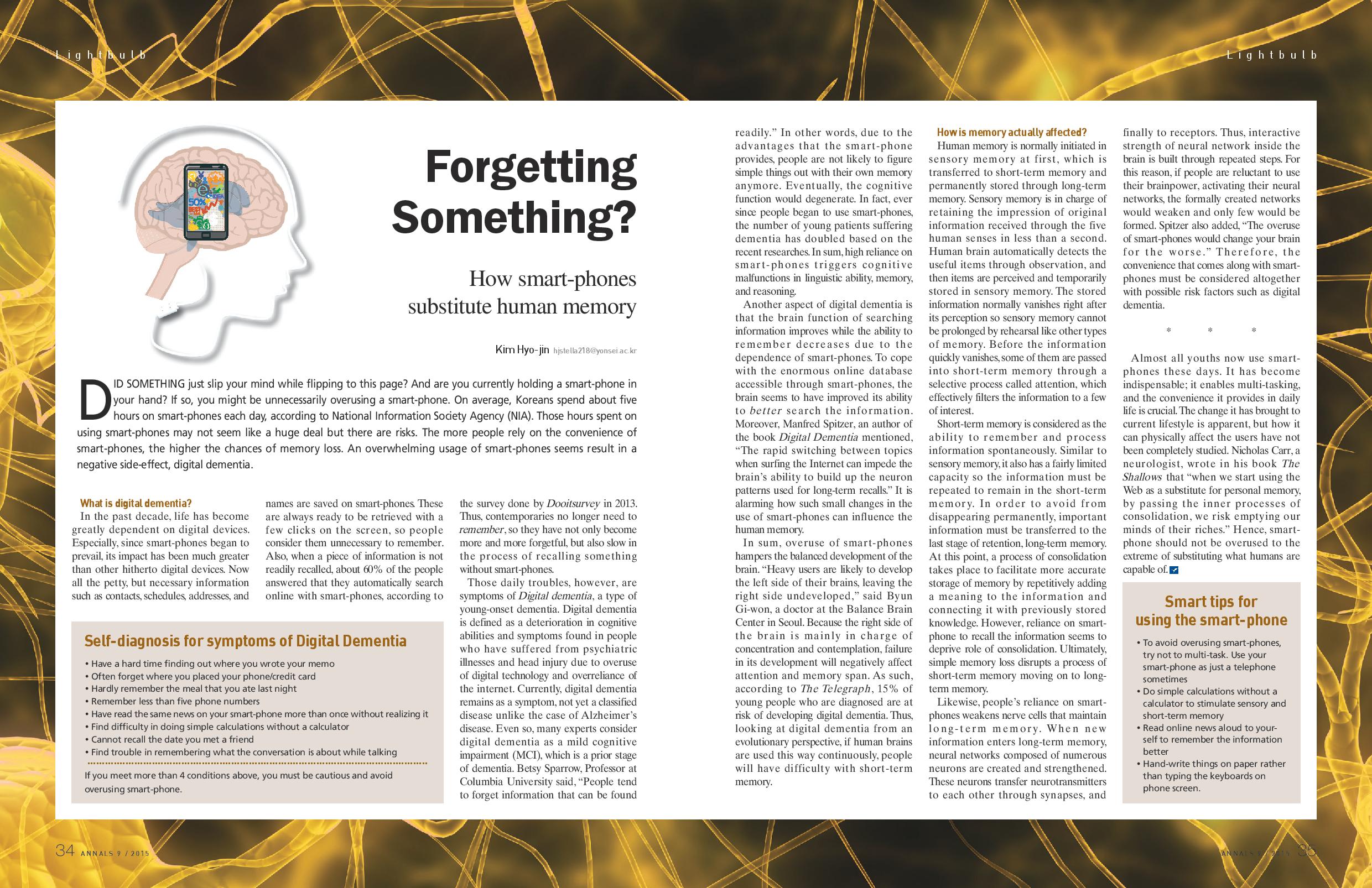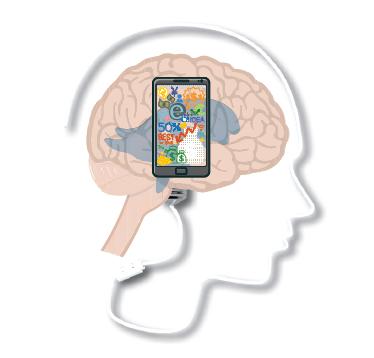How smart-phones substitute human memory
 | ||
 | ||
DID SOMETHING just slip your mind while flipping to this page? And are you currently holding a smart-phone in your hand? If so, you might be unnecessarily overusing a smart-phone. On average, Koreans spend about five hours on smart-phones each day, according to National Information Society Agency (NIA). Those hours spent on using smart-phones may not seem like a huge deal but there are risks. The more people rely on the convenience of smart-phones, the higher the chances of memory loss. An overwhelming usage of smart-phones seems result in a negative side-effect, digital dementia.
What is digital dementia?
In the past decade, life has become greatly dependent on digital devices. Especially, since smart-phones began to prevail, its impact has been much greater than other hitherto digital devices. Now all the petty, but necessary information such as contacts, schedules, addresses, and names are saved on smart-phones. These are always ready to be retrieved with a few clicks on the screen, so people consider them unnecessary to remember. Also, when a piece of information is not readily recalled, about 60% of the people answered that they automatically search online with smart-phones, according to the survey done by Dooitsurvey in 2013. Thus, contemporaries no longer need to *remember*, so they have not only become more and more forgetful, but also slow in the process of recalling something without smart-phones.
Those daily troubles, however, are symptoms of Digital dementia, a type of young-onset dementia. Digital dementia is defined as a deterioration in cognitive abilities and symptoms found in people who have suffered from psychiatric illnesses and head injury due to overuse of digital technology and overreliance of the internet. Currently, digital dementia remains as a symptom, not yet a classified disease unlike the case of Alzheimer’s disease. Even so, many experts consider digital dementia as a mild cognitive impairment (MCI), which is a prior stage of dementia. Betsy Sparrow, Professor at Columbia University said, “People tend to forget information that can be found readily.” In other words, due to the advantages that the smart-phone provides, people are not likely to figure simple things out with their own memory anymore. Eventually, the cognitive function would degenerate. In fact, ever since people began to use smart-phones, the number of young patients suffering dementia has doubled based on the recent researches. In sum, high reliance on smart-phones triggers cognitive malfunctions in linguistic ability, memory, and reasoning.
Another aspect of digital dementia is that the brain function of searching information improves while the ability to remember decreases due to the dependence of smart-phones. To cope with the enormous online database accessible through smart-phones, the brain seems to have improved its ability to better search the information. Moreover, Manfred Spitzer, an author of the book Digital Dementia mentioned, “The rapid switching between topics when surfing the Internet can impede the brain’s ability to build up the neuron patterns used for long-term recalls.” It is alarming how such small changes in the use of smart-phones can influence the human memory.
In sum, overuse of smart-phones hampers the balanced development of the brain. “Heavy users are likely to develop the left side of their brains, leaving the right side undeveloped,” said Byun Gi-won, a doctor at the Balance Brain Center in Seoul. Because the right side of the brain is mainly in charge of concentration and contemplation, failure in its development will negatively affect attention and memory span. As such, according to The Telegraph, 15% of young people who are diagnosed are at risk of developing digital dementia. Thus, looking at digital dementia from an evolutionary perspective, if human brains are used this way continuously, people will have difficulty with short-term memory.
How is memory actually affected?
Human memory is normally initiated in sensory memory at first, which is transferred to short-term memory and permanently stored through long-term memory. Sensory memory is in charge of retaining the impression of original information received through the five human senses in less than a second. Human brain automatically detects the useful items through observation, and then items are perceived and temporarily stored in sensory memory. The stored information normally vanishes right after its perception so sensory memory cannot be prolonged by rehearsal like other types of memory. Before the information quickly vanishes, some of them are passed into short-term memory through a selective process called attention, which effectively filters the information to a few of interest.
Short-term memory is considered as the ability to remember and process information spontaneously. Similar to sensory memory, it also has a fairly limited capacity so the information must be repeated to remain in the short-term memory. In order to avoid from disappearing permanently, important information must be transferred to the last stage of retention, long-term memory. At this point, a process of consolidation takes place to facilitate more accurate storage of memory by repetitively adding a meaning to the information and connecting it with previously stored knowledge. However, reliance on smart-phone to recall the information seems to deprive role of consolidation. Ultimately, simple memory loss disrupts a process of short-term memory moving on to long-term memory.
Likewise, people’s reliance on smart-phones weakens nerve cells that maintain long-term memory. When new information enters long-term memory, neural networks composed of numerous neurons are created and strengthened. These neurons transfer neurotransmitters to each other through synapses, and finally to receptors. Thus, interactive strength of neural network inside the brain is built through repeated steps. For this reason, if people are reluctant to use their brainpower, activating their neural networks, the formally created networks would weaken and only few would be formed. Spitzer also added, “The overuse of smart-phones would change your brain for the worse.” Therefore, the convenience that comes along with smart-phones must be considered altogether with possible risk factors such as digital dementia.
* * *
Almost all youths now use smart-phones these days. It has become indispensable; it enables multi-tasking, and the convenience it provides in daily life is crucial. The change it has brought to current lifestyle is apparent, but how it can physically affect the users have not been completely studied. Nicholas Carr, a neurologist, wrote in his book The Shallows that “when we start using the Web as a substitute for personal memory, by passing the inner processes of consolidation, we risk emptying our minds of their riches.” Hence, smart-phone should not be overused to the extreme of substituting what humans are capable of.
Box 1
| Self-diagnosis for symptoms of Digital Dementia |
| 1. Have a hard time finding out where you wrote your memo |
| 2. Often forget where you placed your phone/credit card |
| 3. Hardly remember the meal that you ate last night |
| 4. Remember less than five phone numbers |
| 5. Have read the same news on your smart-phone more than once without realizing it |
| 6. Find difficulty in doing simple calculations without a calculator |
| 7. Cannot recall the date you met a friend |
| 8. Find trouble in remembering what the conversation is about while talking |
| If you meet more than 4 conditions above, you must be cautious and avoid overusing smart-phone. |
Box 2
| Smart tips for using the smart-phone |
| 1.To avoid overusing smart-phones, try not to multi-task. Use your smart-phone as just a telephone sometimes |
| 2. Do simple calculations without a calculator to stimulate sensory and short-term memory |
| 3. Read online news aloud to yourself to remember the information better |
| 4. Hand-write things on paper rather than typing the keyboards on phone screen. |
Kim Hyo-jin
hjstella218@yonsei.ac.kr

